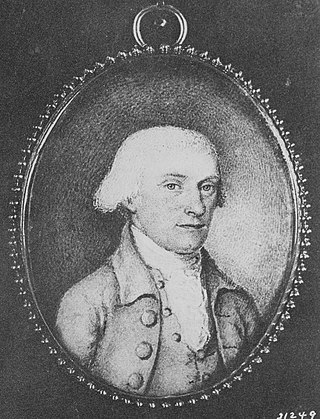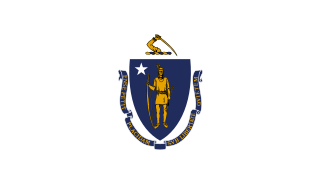Related Research Articles

Elbridge Gerry was an American Founding Father, merchant, politician, and diplomat who served as the fifth vice president of the United States under President James Madison from 1813 until his death in 1814. He is known to be the father and namesake of the political practice of gerrymandering.

Shays's Rebellion was an armed uprising in Western Massachusetts and Worcester in response to a debt crisis among the citizenry and in opposition to the state government's increased efforts to collect taxes on both individuals and their trades. The fighting took place in the areas around Springfield during 1786 and 1787. Historically, scholars have argued that the four thousand rebels, called Shaysites, who protested against economic and civil rights injustices by the Massachusetts Government were led by Revolutionary War veteran Daniel Shays. By the early 2020s, scholarship has suggested that Shays's role in the protests was significantly and strategically exaggerated by Massachusetts elites, who had a political interest in shifting blame for bad economic conditions away from themselves.

Marblehead is a coastal New England town in Essex County, Massachusetts, United States, along the North Shore. Its population was 20,441 at the 2020 census. The town lies on a small peninsula that extends into the northern part of Massachusetts Bay. Attached to the town is a near island, known as Marblehead Neck, connected to the mainland by a narrow isthmus. Marblehead Harbor, protected by shallow shoals and rocks from the open sea, lies between the mainland and the Neck. Beside the Marblehead town center, two other villages lie within the town: the Old Town, which was the original town center, and Clifton, which lies along the border with the neighboring town of Swampscott.

Timothy Pickering was the third United States Secretary of State under Presidents George Washington and John Adams. He also represented Massachusetts in both houses of Congress as a member of the Federalist Party. In 1795, he was elected a member of the American Philosophical Society.

The Boston campaign was the opening campaign of the American Revolutionary War, taking place primarily in the Province of Massachusetts Bay. The campaign began with the Battles of Lexington and Concord on April 19, 1775, in which the local colonial militias interdicted a British government attempt to seize military stores and leaders in Concord, Massachusetts. The entire British expedition suffered significant casualties during a running battle back to Charlestown against an ever-growing number of militia.

Jonathan Jackson was an American businessman and politician from Newburyport, Massachusetts. He was most notable for his service as a delegate from Massachusetts in the Continental Congress in 1782, the first United States Marshal for the District of Massachusetts from 1789 to 1791, and Treasurer and Receiver-General of Massachusetts from 1802 to 1806.

The 1788–89 United States House of Representatives elections were the first U.S. House of Representatives elections following the adoption of the Constitution of the United States. Each state set its own date for its congressional elections, ranging from November 24, 1788, to March 5, 1789, before or after the first session of the 1st United States Congress convened on March 4, 1789. They coincided with the election of George Washington as the first president of the United States.
The 14th Continental Regiment, also known as the Marblehead Regiment and Glover's Regiment, was raised as a Massachusetts militia regiment in 1775, and taken into the Continental Army establishment during the summer of 1775. When the Continental Army was reestablished for 1776, the regiment was redesignated the 14th Continental. Composed of seafaring men from the area around Marblehead, Massachusetts, it manned the boats during the New York and New Jersey campaign of 1776 and the crossing of the Delaware River before and after the Battle of Trenton. The men of the regiment were only enlisted for one and a half years, and the regiment was disbanded on December 31, 1776, in eastern Pennsylvania.

John Glover was an American fisherman, merchant, politician, and military leader from Marblehead, Massachusetts, who served as a brigadier general in the Continental Army during the American Revolutionary War. He is most famous in American history for his role in helping found what would become the United States Navy, along with his regiment rowing Washington across the Delaware, the Battle of Long Island, and leading one of the first integrated regiments in the American Revolution.
Nanepashemet was a sachem and bashabe or great leader of the Pawtucket Confederation of Abenaki peoples in present-day New England before the landing of the Pilgrims. He was a leader of Native peoples over a large part of what is now coastal Northeastern Massachusetts.

The General John Glover House is a National Historic Landmark at 11 Glover Square in Marblehead, Massachusetts. It is a 2+1⁄2-story gambrel-roofed colonial built in 1762 by John Glover (1732–1797), a local merchant, politician, and militia leader who gained fame for his military leadership in the American Revolutionary War. The house was declared a National Historic Landmark and added to the National Register of Historic Places in 1972, for its association with Glover, who lived here during the war years.

The Ephraim Potter House, a historic house and former pest house at 158 Fairhaven Road in Concord, Massachusetts, is also known as the Pest House, a name used in the 18th century to describe a building in which to quarantine those afflicted with communicable diseases such as tuberculosis, cholera, or smallpox.

Children's Island, formerly known as "Cat Island" is an island off Marblehead, Massachusetts, and is part of the City of Salem, Massachusetts. The YMCA of the North Shore has owned and operated a children's day camp on it since 1955. The first written record of the island was in 1655 when it was granted to Governor John Endecott. It was then bought and sold several times until around the Revolutionary War when the Essex hospital was built as a smallpox inoculation site. The hospital was burned down by townspeople of Marblehead. By the end of the 19th century, the Lowell island house was established as a summer resort. This was run for about 30 years before being converted into a sanitarium for sick and crippled children until 1946. The island then lay unused until bought by the YMCA and converted into a day camp.

Caleb Davis was an American merchant, revolutionary patriot, and public servant in Boston, Massachusetts. He held several positions of public trust, including state legislator (1776–1788), Speaker of the Massachusetts General Court (1780–1782) and Elector for Massachusetts' Suffolk County in the first U.S. presidential election in 1789.
The Essex Hospital was a privately built smallpox inoculation hospital on Cat Island where many people were effectively inoculated against smallpox in 1773–1774. About a year after it opened, it was burned to the ground by paranoid and angry townspeople of Marblehead, Massachusetts.
William Browne was a justice of the Massachusetts Superior Court of Judicature from 1774 to 1775, and Governor of Bermuda from 1782 to 1788.

The 8th Regiment Massachusetts Volunteer Militia was a peacetime regiment of infantry that was activated for federal service in the Union Army for three separate tours during the American Civil War. The regiment consisted almost entirely of companies from Essex County, Massachusetts. The Cushing Guards, established 1775, were Company A based in Newburyport. The Lafayette Guards, created 1825, were Company B from Marblehead. Company C, the Sutton Light Infantry, organized in 1805 as the Marblehead Light Infantry, was also from Marblehead. The Lynn Light Infantry, chartered in 1852 was Company D. Company E was the Beverly Light Infantry, organized in 1814. The second Lynn company was Company F, the City Guards, organized in 1814. The Gloucester unit in the regiment was Company G, the American Guards, first organized in 1788. The third and last Marblehead company was H, the Glover Light Guards, created in 1852 and named in honor of John Glover of the Revolution. The Salem Light Infantry, Company J, had been created in 1805 and in 1859 had taken up Zouave drill and were thence known as the Salem Zouaves. The lone non-Essex company was Company K, the Allen Guards, created in 1806, that came to the regiment from Berkshire County's reorganized old Tenth Militia regiment, and based in Pittsfield.
Joshua Atherton, was a lawyer and early anti-slavery campaigner in Massachusetts and New Hampshire. He served as Attorney General of New Hampshire. In later years he was also commissioner for the United States direct tax.
Elections to the Massachusetts Senate were held during 1788 to elect 40 State Senators. Candidates were elected at the county level, with some counties electing multiple Senators.
References
- 1 2 Brown, John Howard (2006). The Cyclopedia Of American Biography. Vol. 6 (Reprint ed.). Kessinger Publishing. p. 78. ISBN 9781428640511.
- ↑ Essex Institute historical collections. Vol. 58. Essex Institute, Peabody Essex Museum. Essex Institute Press. 1922. pp. 313–314.
{{cite book}}: CS1 maint: others (link) - ↑ Chapman, Joseph Warren (1903). Vital records of Marblehead, Massachusetts, to the end of the year 1849. Vol. 1, Births. The Essex institute. pp. 373–374.
- 1 2 3 Schutz, John A. (1997). Legislators of the Massachusetts General Court, 1691-1780: A Biographical Dictionary. UPNE. p. 299. ISBN 9781555533045.
- ↑ Gilje, Paul A. (1999). Rioting in America (3, reprint ed.). Indiana University Press. pp. 44–45. ISBN 9780253212627.
- ↑ Lossing, Benson John (1888). Harpers' popular cyclopaedia of United States history from the aboriginal period: containing brief sketches of important events and conspicuous actors. Vol. 2. Harper. p. 1036.
- ↑ Tourtellot, Arthur Bernon (April 1, 2000). Lexington and Concord: The Beginning of the War of the American Revolution (reprint ed.). W. W. Norton. pp. 96–97. ISBN 9780393320565.
- ↑ "Massachusetts 1788 U.S. Senate, Ballot 7". Tufts Digital Collations and Archives. A New Nation Votes: American Election Returns 1787–1825. Tufts University . Retrieved February 15, 2018.
- ↑ Jensen & Becker 1976, p. 520.